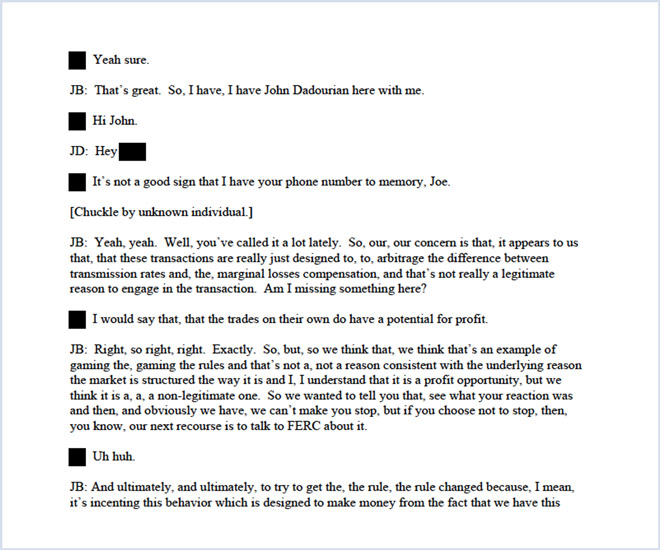By Ted Caddell and Rich Heidorn Jr.
Powhatan Energy Fund’s trading to capitalize on line-loss rebates cost more than 20 market participants at least $100,000 each, according to a PJM analysis, with Exelon, American Electric Power and Dominion Resources each losing more than $1 million.
The results of the analysis were included among more than 300 pages of documents released by the Federal Energy Regulatory Commission’s Office of Enforcement last week as it argued against Powhatan’s request for more time to respond to market manipulation allegations.
FERC on Friday rejected Powhatan’s request to delay the filing, which was due today. But it said Powhatan could make a supplemental submission by Feb. 9 addressing the materials provided with OE’s response.
Powhatan filed a blunt-spoken response late Monday, in which they criticize the OE staff report on the case as “a pile of nonsense” (IN15-3).
The information released by FERC included a July 2010 audio recording of PJM Market Monitor Joe Bowring that Powhatan had sought in a Jan. 27 filing.
Powhatan argued that the recording that could prove that Bowring didn’t think its trading strategy — which collected line-loss rebates on what FERC contends were riskless up-to-congestion trades — was illegal. (See Gates, Powhatan Say FERC Enforcers Didn’t Share Crucial Info.)
FERC issued an Order to Show Cause in December seeking $29.8 million in fines from twins Rich and Kevin Gates and Houlian “Alan” Chen, who traded on behalf of their Powhatan hedge fund.
Losses Suffered
Enforcement recently asked PJM to run simulations to calculate how other market participants were affected by the trades by Powhatan and two other funds controlled by Chen and the Gates brothers.
In its response last Thursday, Enforcement said PJM’s analysis showed that the harm from the trading “was both widely distributed throughout PJM and significantly concentrated on certain load-serving entities” with more than 20 market participants losing more than $100,000 each.
The biggest losers were Appalachian Power (an AEP subsidiary), which lost $1.45 million, Dominion Virginia Power ($1.15 million) and Exelon’s PECO Energy and Commonwealth Edison ($1.2 million combined).
Powhatan Response Filed
Late Monday, Powhatan’s filed a 49-page response to the Order to Show Cause.
It disputes Enforcement’s characterization of its strategy as “wash-like” trades and claims the FERC proceeding is unconstitutional because the defendants never received prior notice that the trades at issue were unlawful.
“There is nothing inherently fraudulent about taking advantage of a market inefficiency or ‘loophole,’” they said, asking the commission to absolve them.
“The commission has an opportunity here to demonstrate true leadership. An opportunity to make a decision based on the right reasons — like fidelity to the law and fundamental fairness — instead of the wrong ones, like deference to OE staff just because the staff has consumed over four years on its up-to-congestion (UTC) investigation.
“This investigation has been so poorly conceived and poorly executed that it does a disservice to the commission,” they continued. “If this case proceeds any further, it will be a train wreck for FERC.”
PJM Comments
PJM issued a statement saying that Powhatan’s filing “illustrates only its failure to appreciate the unique legal and regulatory framework governing organized wholesale electricity markets. The electricity business, at its core, is still a public service in which Congress has mandated that consumers pay just and reasonable prices.”
It added, “FERC’s regulatory mission differ significantly from the regulation of traditional financial markets and the role played by the Securities and Exchange Commission. The exploitation of loopholes — although of questionable benefit to society — might be lawful behavior in financial and other commodity markets. In electricity markets, however, the Federal Power Act imposes a higher standard to protect consumers and other market participants from activities that increase prices without providing any accompanying benefits.”
Transparency

Kevin Gates said Saturday that the release of the information was a vindication of Powhatan’s decision to launch a public relations campaign against FERC, which included a website containing documents and testimonials from attorneys and economists supporting their defense.
“Going public with ferclitigation.com … put pressure on them to get us the materials, as they knew there’d be transparency on their behavior,” he said. “Still, though, they haven’t been fair. For instance, [Friday night] at 7:12 p.m., they sent us additional materials that they previously had not produced.”
Powhatan said the July 2010 recording captures a phone conversation between Bowring and another trader discussing trades like those at the heart of the Powhatan investigation.
On the tape, according to the Gates’ Jan. 27 filing, “Dr. Bowring says that the trades did not violate the rules, that he understands why the traders engaged in them, and that the rules need to be changed to remove the incentives that drove the trading. He also says that he would not refer the trading conduct to Enforcement if the traders stopped the trading in question.
“That last point is key because the PJM Tariff requires Dr. Bowring to refer trading that he thinks might be market manipulations,” according to the filing.
Under the so-called Brady rule, prosecutors are required to provide targets exculpatory evidence in the government’s possession. Gates’ attorneys said they asked for possible Brady material in August, and although materials were provided, the tape recording in question was not.
OE: Bowring Tape not Exculpatory

Enforcement said it was providing the tape even though it was not exculpatory, and therefore didn’t fall under Brady. “This conversation relates to the behavior of another market participant and is not remotely exculpatory of [Powhatan’s] conduct,” it said.
According to a transcript of the recording, Bowring tells the unnamed trader that trades designed solely to collect line-loss rebates are not “legitimate.” Bowring says that while the trader was “not violating the rules” — an apparent reference to PJM’s Tariff — his actions were “not consistent with the spirit of the rules.”
Bowring says if the trader does not stop the questionable trading, the Monitor would refer the matter to FERC. The trader assures Bowring he has stopped the trading in question.
Bowring concludes the conversation by saying “we’re not going to take any further action on this” but adds he would be approaching PJM and perhaps FERC to discuss changing the market rules.
Enforcement said that Bowring informed FERC of his concerns the day after the conversation.
“The IMM, PJM and the commission all expressed concern about this behavior being harmful and potentially manipulative and all worked with alacrity to address it — and none of them ever alleged that it was a Tariff violation,” Enforcement said.
It noted that the recording appears to have been made in Pennsylvania, which requires mutual consent for recording phone calls. It said there is “no indication” that Bowring consented to these recordings. Enforcement said it did not name the trader on the tape because he has not been accused of market manipulation.
FERC spokeswoman Mary O’Driscoll said last week she would not comment on a pending matter. Bowring could not be reached for comment.




